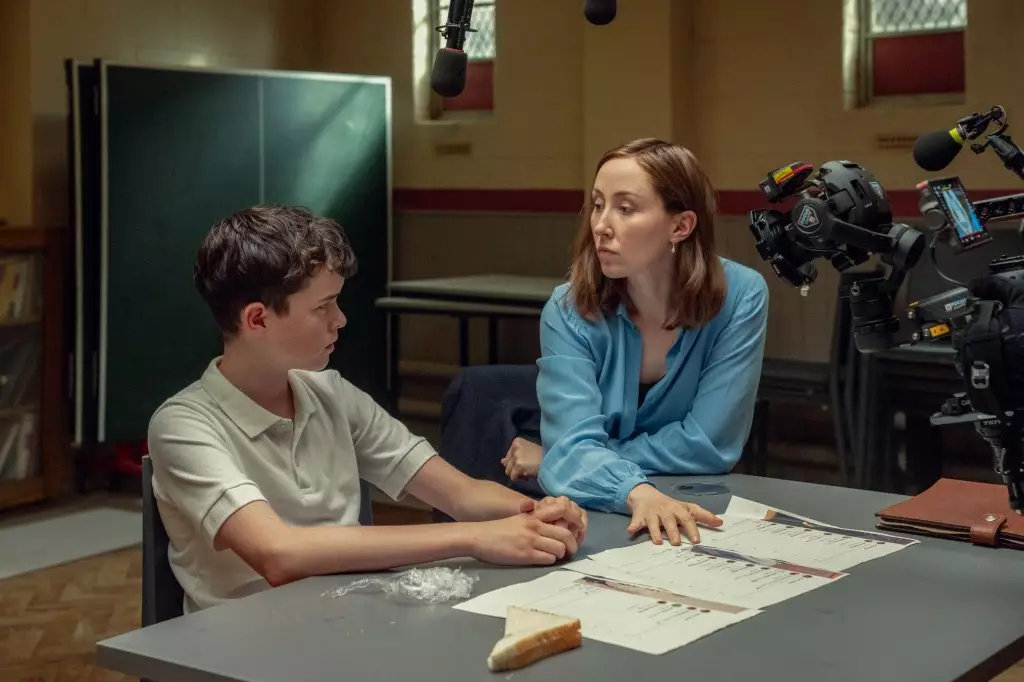In an era where streaming giants like Netflix dominate screens worldwide, the debate about the value of traditional broadcasters versus streaming platforms has intensified. Channel 4’s news boss Louisa Compton’s candid critique of Netflix as “TV tourists” exposes a fundamental tension at the heart of modern television production. While streamers excel at capturing international audiences with high-profile shows like *Adolescence*, they often lack the depth and investigative rigor that Public Service Broadcasters (PSBs) are renowned for. Compton’s perspective underscores an essential truth: that true journalism and meaningful storytelling stem from a grounded, locally rooted perspective—something streaming services either overlook or undervalue.
Her analogy of broadcasters as “proud parents” nurturing new talent poignantly captures the essence of support that comes from long-term investment. It’s easy to admire the flashiness of a hit show like *Adolescence*, but it’s far more significant to recognize the years of dedication, creative nurturing, and cultural context provided by public broadcasters. By reinforcing this argument, Compton champions the importance of fostering authentic stories that serve the public interest rather than merely chasing viral international sensations.
Streaming platforms, with their high budgets and global ambitions, tend to prioritize spectacular production values and immediate commercial appeal. While this may deliver instant gratification, it risks diluting the nuanced storytelling that characterizes many of the most meaningful works of the past. The distinct role of PSBs—delivering current affairs, investigative journalism, and socially engaging content—is crucial for a healthy democratic society. Compton’s critique isn’t just a nostalgic plea but a vital reminder that some stories require local context, investigative rigor, and a commitment to social responsibility that streamers generally don’t prioritize.
the Economics and Risks of International Co-Productions
The tension between the financial realities of producing high-budget drama and the artistic integrity of storytelling surfaces loudly in discussions about co-productions like Netflix’s *Adolescence*. These collaborations are often necessary because of the astronomical costs associated with cinematic quality on television. But as industry insiders like Simon Heath of World Productions note, this model carries inherent risks. When UK producers rely heavily on international funding, there’s a danger they’ll alter their creative vision to meet the expectations of global audiences, potentially sacrificing local relevance.
Heath’s concern reflects a broader anxiety: that the pursuit of international appeal could lead to a homogenization of content. It’s easy to envision a future where stories are crafted less for their cultural significance and more to tick international boxes, diluting the essence of what makes UK storytelling distinctive. This raises a critical question about the longevity of true artistic originality if economic pressures compel creators to prioritize marketability over authenticity.
Heath’s back-to-basics approach, reconsidering low-cost drama, hints at an industry at a crossroads. As streamers escalate production quality to cinema-like levels, traditional broadcasters are challenged to innovate under financial constraints. This climate threatens to marginalize small-scale productions that once thrived precisely because of their agility and focus on local stories. If the industry leans too heavily on international funding and blockbuster ambitions, it risks losing the grassroots creativity that forms the backbone of culturally significant programming.
In-House Productions and the Future of Independent Creativity
The debate around Channel 4’s newly proposed in-house production unit reveals deeper concerns about the health and independence of the UK’s creative ecosystem. Critics like John McVay argue that such centralized, internally managed units could limit the diversity and innovation generated by independent producers. The concern is that by internalizing production, Channel 4 might stifle the very creative freedoms that independent companies have historically enjoyed.
Compton’s response underscores an important point: the in-house production team was a government-mandated decision, not an industry-driven strategy. She emphasizes that supporting independent producers is vital for maintaining a vibrant, diverse television landscape. This debate isn’t just about organizational structure; it’s about safeguarding the cultural independence that ensures a broad range of stories are told. A healthy mix of in-house and independent productions can foster competition, innovation, and cultural relevance—cornerstones of a thriving creative sector.
More broadly, the discussion hints at a pressing need for the industry to resist the allure of quick international hits at the cost of nurturing local talent and stories. As global streaming platforms often favor globally marketable content, establishing resilient domestic production ecosystems becomes even more critical for preserving local voices. Channel 4’s challenge, then, isn’t simply about organizational management but about committing to a future where genuine storytelling, rooted in local realities and social importance, remains central.
—
The ongoing debate isn’t merely about who produces what or where it’s streamed. It touches on the very soul of what makes television a powerful medium for societal reflection, cultural preservation, and creative innovation. To flourish in the future, the industry must prioritize authenticity, uphold the value of local stories, and resist the homogenizing pressures of globalized commercial interests. Only through such a commitment can television continue to serve not just entertainment, but as a vital force for social engagement and constructive discourse.
